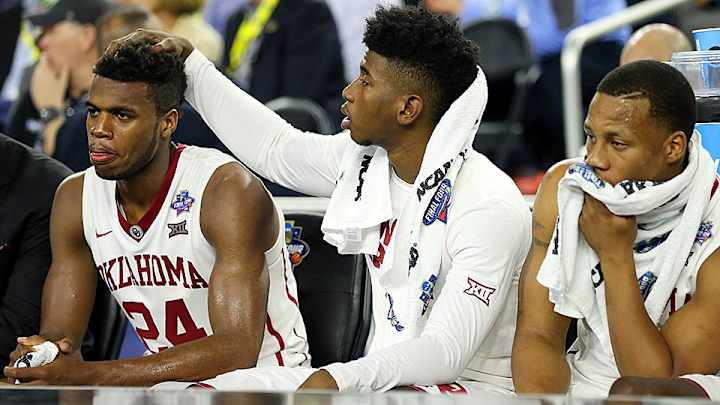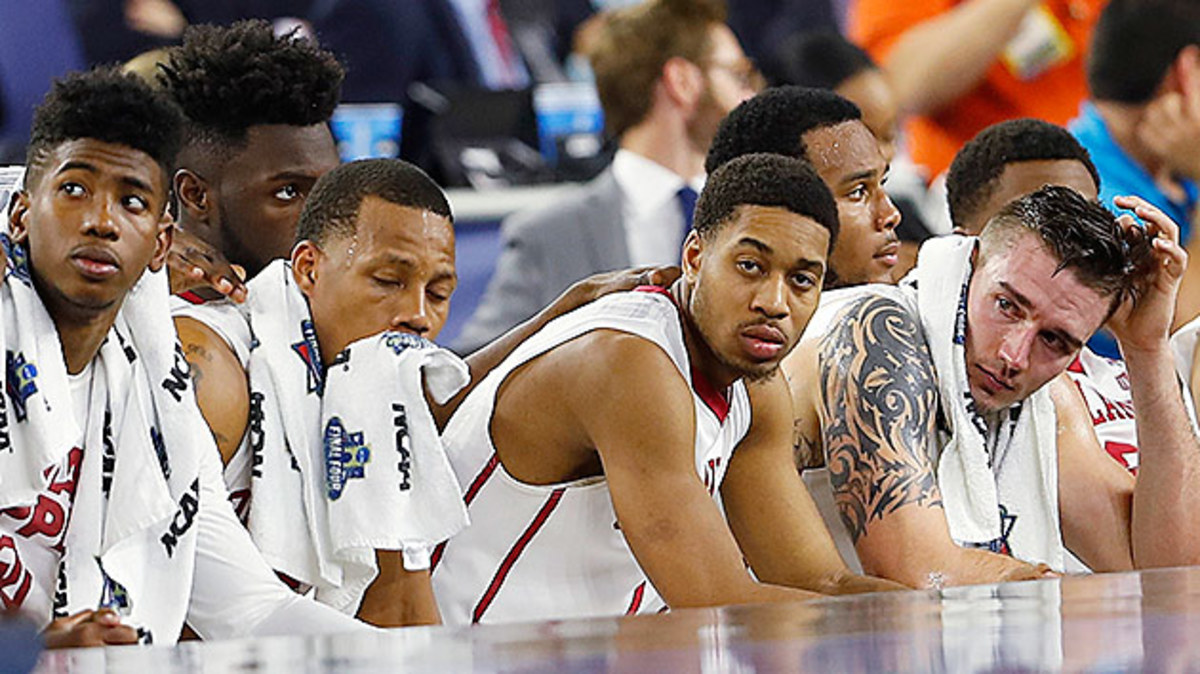In titanic loss, Buddy Hield’s career at Oklahoma comes to a solemn end

Get all of Dan Greene’s columns as soon as they’re published. Download the new Sports Illustrated app (iOS or Android) and personalize your experience by following your favorite teams and SI writers.
HOUSTON — Where was Buddy? Fifteen long minutes had passed in Oklahoma’s sullen locker room after its historic defeat against Villanova and only one Sooner was missing. An expectant crowd of reporters gathered at the room’s entrance, notebooks and voice records and well-lit television cameras at the ready, awaiting the arrival of star guard Buddy Hield, the last straggler from the postgame press conference down the hall. Few of his teammates, understandably, could manage or would allow much exposition regarding the game, and so eyes shifted to the team’s resident extrovert and the center of the entire tournament’s attention, to explain how, exactly, that had just happened.
Finally Hield strode into the room, a hint of an understanding smile on his lips, parting the media mass as he made his way to his far-corner locker. The crowd followed and reassembled around him in a semi-circle, hovering downward around the now-seated star, one TV reporter practically in teammate Christian James’s lap. Immediately came the questions, one after another and sometimes more than one at once. Hield looked up and answered them all.
Villanova was aggressive, he said. He got good looks, but missed. The Wildcats made so many shots it sucked the life out of the Sooners. It was their time. It was not Oklahoma’s.
“What they did,” Hield said, “was remarkable.”
Hyper-focused Villanova exacts revenge in historic Final Four win
What else was there to say? Oklahoma’s 95–51 loss to Villanova in Saturday’s national semifinal was a stunningly thorough, belief-stretching display of dominance in which one No. 2 seed who had lost to another by 23 earlier this season avenged its defeat with the most lopsided victory in the 78-year history of the Final Four. The Sooners allowed more points in the second half than they scored all game. Villanova shot 71.4% from the floor and 61.1% from three. A game with 11 lead changes in its first nine minutes blew wide open and then wider still, sending its losing team to sit dazed in the locker room, so many of them staring silently down into their phones or out toward nothing at all.
In doing so, one of college basketball’s most well-worn and feel-good stories was given a jarringly incongruent ending. By now the beats of Hield’s journey are familiar: the homemade milk-crate baskets as a hoops-obsessed boy in the Bahamas, the marathon reggae-soundtracked shooting sessions that helped make him a two-time Big 12 player of the year. In March he crossed over as his sport’s rare household mononym on the back of the most prolific four-game NCAA tournament output—117 points, or 29.3 per game—since Davidson’s Stephen Curry in 2008.
This first weekend of April seemed primed to continue his apotheosis. He had long dreamed of reaching a Final Four and bypassed the NBA draft last spring to do so, and when he finally arrived this week he was in a city dotted by “Buddy Buckets” T-shirts, where he could hardly leave the team hotel without attracting a crowd. He exited it early and in a manner his rosy imagination likely did not conjure, with just his second single-digit scoring performance of the season in a runaway loss. He spent the team’s final huddle under the arm of teammate Khadeem Lattin, who rustled Hield’s towel-covered head with his hand. The team he so often carried now offered him consolation.
The night had begun so promisingly: On the game’s opening possession, Hield cut short a drive against Villanova guard Ryan Arcidiacono and pulled up for a three that fell smoothly through the net. Hield would add a jumper three minutes later but spend the next 15 minutes scoreless, as the Wildcats rotated a series of on-ball defenders against him with a second defender lurking to offer help.
UNC’s atypical approach to building a modern team pays off in Final Four
Still Oklahoma kept pace for most of the half, exchanging a bevy of jumpers that laid waste to the week’s speculation about the impact of NRG Stadium’s history of meager three-point shooting. It was only when the Sooners began failing to get off any shot at all that Villanova seized control; during one six-minute span Oklahoma had six turnovers, a span that coincided with the Wildcats using a 10–2 run to pull ahead by nine. The Sooners entered halftime trailing by 14 and having allowed Villanova to shoot a blistering 66.7% while scoring 15 points off of nine turnovers. This, Oklahoma’s coaches told the team during the break, was not the team that made the Final Four.
The second half’s opening minutes contained such traces. Junior guard Jordan Woodard drained a three from the wing for his first points of the game, then was fouled on a three-point try the next possession. He made his first two free throws, missed the third, and came flying through the lane to score on the putback, roaring as he cut the lead back down to single digits. But it would not last. Villanova called timeout after the play, then the game stopped again after the next possession for a TV timeout after a foul. After the two lengthy stoppages, the Sooners could not recapture their flow. Three minutes later Villanova would begin a run of 25 unanswered points. “We had some fire, we had some fight,” said assistant coach Chris Crutchfield. “That was eight minutes going by that killed the momentum.”

And thus there would be no sustained Sooners boom. Instead the Wildcats buried them under a flurry of shots—a number of them contested, some of them off-balance—seemingly magnetized through the hoop by unseen forces, making 17-of-22 (or 77.3%) second-half shots en route to the best Final Four shooting performance since the school’s national championship team in 1985.
“When we played great defensive possessions, they hit a shot right after that,” said Sooners forward Dante Buford. “It killed our confidence.”
Said Hield: “When the other team is making shots like that ... it sucks the life out of you.”
Meanwhile the Sooners could hardly muster any offense of their own, shooting 20% from the floor and 12.5% (2 for 16) from three in the second half. Clean looks grew rare, then often turned into misses, a complete reversal from Oklahoma’s blistering outside shooting during the team’s nonconference meeting in Hawaii. “They’re more connected defensively than they were in December,” Crutchfield said of Villanova. On Hield, explained Kruger, “They were up into him. They were very aggressive. They had good help when Buddy did drive it. I thought their alertness, their awareness was just very, very good. They were quick to recover.”
And so Hield spent the game’s final two minutes on the bench, embracing his teammates and coaches after scoring nine points on 4-of-12 shooting. He, Woodard, fellow guard Isaiah Cousins and forward Ryan Spangler had started 105 games together, beginning 250 miles north in Dallas, in a November 2013 win over Alabama. As Saturday’s game wound down, Hield told each of them he loved them, then sat perched on the edge of the court before the quartet would walk off together one last time.
• THAMEL: Who are potential replacements for UNC coach Williams?
At his locker, Hield was not yet in a reflective mood. When a reporter asked what he thought would be his legacy at Oklahoma, where he has surely joined the program’s pantheon of all-time greats, Hield said, “We made it to the Final Four, but it’s tough going out like this, man. I can’t really reflect on my career right now.” After as reporter showed him an image of fans back in the Bahamas watching the game, Hield talked about his pride in representing them before offering an apology for falling short. “Don’t be sorry, Buddy,” the reporter told him. Hield echoed himself. “It’s tough, man,” he said.
But there were moments when Hield’s familiar glow shone through his dour demeanor, when the Buddy so many had come to know reappeared. He spoke about his appreciation of Oklahoma, which he called his second home. He smiled when a reporter asked what it would feel like to take off his jersey for the last time, saying, “I still have it on. I don’t know.” And he was not willing to let the end of his collegiate career sully the rest of it. “You can’t let this one game define you,” he said. “This team’s been fun. This was a tough loss tonight. But life goes on.”
